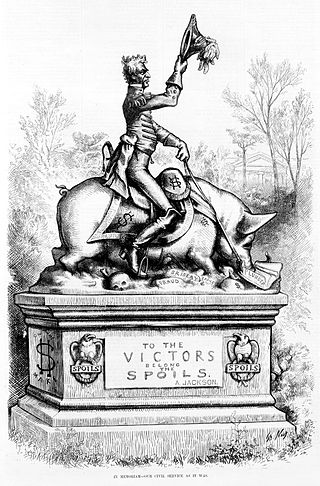The Civic Platform is a centre-right liberal political party in Poland. Since 2021, it has been led by Donald Tusk, who previously led it from 2003 to 2014 and was president of the European Council from 2014 to 2019.
A Tory is an individual who supports a political philosophy known as Toryism, based on a British version of traditionalist conservatism which upholds the established social order as it has evolved through the history of Great Britain. The Tory ethos has been summed up with the phrase "God, King, and Country". Tories are monarchists, were historically of a high church Anglican religious heritage, and were opposed to the liberalism of the Whig party.

The Federalist Party was a conservative and nationalist American political party and the first political party in the United States. Under Alexander Hamilton, it dominated the national government from 1789 to 1801. Defeated by the Democratic-Republican Party in 1800, it became a minority party while keeping its stronghold in New England and made a brief resurgence by opposing the War of 1812. It then collapsed with its last presidential candidate in 1816. Remnants lasted for a few years afterwards. The party appealed to businesses and to conservatives who favored banks, national over state government, manufacturing, an army and navy, and in world affairs preferred Great Britain and strongly opposed the French Revolution and Napoleonic wars. The party favored centralization, federalism, modernization, industrialization, and protectionism.

In politics and government, a spoils system is a practice in which a political party, after winning an election, gives government jobs to its supporters, friends (cronyism), and relatives (nepotism) as a reward for working toward victory, and as an incentive to keep working for the party—as opposed to a merit system, where offices are awarded or promoted on the basis of some measure of merit, independent of political activity.

Jacksonian democracy was a 19th-century political philosophy in the United States that expanded suffrage to most white men over the age of 21 and restructured a number of federal institutions. Originating with the seventh U.S. president, Andrew Jackson and his supporters, it became the nation's dominant political worldview for a generation. The term itself was in active use by the 1830s.
The Tories were a loosely organised political faction and later a political party, in the Parliaments of England, Scotland, Ireland, Great Britain and the United Kingdom. They first emerged during the 1679 Exclusion Crisis, when they opposed Whig efforts to exclude James, Duke of York from the succession on the grounds of his Catholicism. Despite their fervent opposition to state-sponsored Catholicism, Tories opposed his exclusion because of their belief that inheritance based on birth was the foundation of a stable society.

The Conservative Party of Canada was a major federal political party in Canada that existed from 1867 to 1942. The party adhered to traditionalist conservatism and its main policies included strengthening relations with Great Britain, nationalizing industries, and promoting high tariffs.

The Janata Party is an unrecognized political party in India. It was founded as an amalgam of Indian political parties opposed to the Emergency that was imposed between 1975 and 1977 by Prime Minister Indira Gandhi of the Indian National Congress. In the 1977 general election, the party defeated the Congress and Janata leader Morarji Desai became the first non-Congress prime minister in independent modern India's history.

The New Zealand Party operated as a political party in New Zealand from 1983 to 1993. Established by millionaire property tycoon Bob Jones, the party promoted economic liberalisation—it was the first political party to promote free market reforms. It failed to win any seats in Parliament, but it purportedly played a role in causing the defeat of Robert Muldoon's National government in the 1984 election by splitting the vote.

The Indonesian Democratic Party was one of the two state-approved parties during the New Order era of the late 20th-century in Indonesia.
Strong Ukraine ; formerly the Labour Party Ukraine, is a political party in Ukraine that was re-established in April 2014. It was originally registered in August 1999 and dissolved in March 2012 after it had merged with the Party of Regions on 17 March 2012. Since late 2009 the party was and is the main vehicle of billionaire Serhiy Tihipko. After the parties merger Tihipko became a member of the Party of Regions. On 7 April 2014 the political council of this party expelled Tihipko from the Party of Regions.

The First Party System was the political party system in the United States between roughly 1792 and 1824. It featured two national parties competing for control of the presidency, Congress, and the states: the Federalist Party, created largely by Alexander Hamilton, and the rival Jeffersonian Democratic-Republican Party, formed by Thomas Jefferson and James Madison, usually called at the time the Republican Party.

Viduthalai Chiruthaigal Katchi formerly known as the Dalit Panthers of India or the Dalit Panthers Iyyakkam is an Indian social movement and political party that seeks to combat caste based discrimination, active in the state of Tamil Nadu. The party also has a strong emphasis on Tamil nationalism. Its chairman is Thol. Thirumavalavan, a lawyer from Chennai and its general secretary is the writer Ravikumar.

The Rhodesia Labour Party was a political party which existed in Southern Rhodesia from 1923 until the 1950s. Originally formed on the model of the British Labour Party from trade unions and being especially dominated by railway workers, it formed the main opposition party from 1934 to 1946. The party suffered a catastrophic split during the Second World War and lost all its seats, and a further split over the attitude to the Federation of Rhodesia and Nyasaland ended its involvement in Rhodesian politics.
A single-member district is an electoral district represented by a single officeholder. It contrasts with a multi-member district, which is represented by multiple officeholders. Single-member districts are also sometimes called single-winner voting, winner-takes-all, single-member constituencies or single-member electorates.
Guided democracy, also called managed democracy, is a formally democratic government that functions as a de facto authoritarian government or, in some cases, as an autocratic government. Such hybrid regimes are legitimized by elections, but do not change the state's policies, motives, and goals. The concept is also related to semi-democracy, also known as anocracy.

The Missouri Democratic Party is the affiliate of the Democratic Party in the U.S. state of Missouri. Its chair is Russ Carnahan, the vice chair is Yvonne Reeves-Chong, the treasurer is Glenda Bainbridge, and the secretary is Jonathan Kessler.

The South African Party was a political party in Cape Colony.

The 1938 Aylesbury by-election was a parliamentary by-election for the British House of Commons constituency of Aylesbury on 19 May 1938.

The 1912 Progressive National Convention was held in August 1912. Angered at the renomination of President William Howard Taft over their candidate at the 1912 Republican National Convention, supporters of former President Theodore Roosevelt convened in Chicago and endorsed the formation of a national progressive party. When formally launched later that summer, the new Progressive Party acclaimed Roosevelt as its presidential nominee and Governor Hiram Johnson of California as his vice presidential running mate. When questioned by reporters, Roosevelt said he felt as strong as a "bull moose". Henceforth known as the "Bull Moose Party", the Progressives promised to increase federal regulation and protect the welfare of ordinary people.















